Are you looking to dive into your family history and discover your roots? Genealogical DNA tests use cutting-edge technology to analyze your DNA and provide you with detailed information about your ancestry, including your ethnicity and potential relatives.
The best DNA test is AncestryDNA because Ancestry has the largest customer database among the big five DNA testing companies. Ancestry’s large database means more DNA matches which is a goldmine for genealogical research.
Quick Summary
- AncestryDNA is by far the most popular consumer DNA test on the market today. If your interest in DNA testing is for genealogy and family history purposes, then you simply must test with AncestryDNA.
- 23andMe is the leader in consumer health testing. They also bundle basic Y-DNA and mtDNA results with tests for no extra charge. Because lots of customers use 23andMe for health testing, the genealogy community is not as great as the competition.
- MyHeritage is best known for it’s large (and rapidly growing) database of international customers which is amazing to find cousins whose families never came to the U.S. DNA testing in regions like Europe is not nearly as popular as in the United States, and MyHeritage is making a big push to capture these markets.
- FamilyTreeDNA is highly regarded in the professional genealogy community. If advanced DNA testing is what you’re after (YDNA and mtDNA), then FamilyTreeDNA is the company for you.
- LivingDNA is a relatively new player in the consumer DNA testing market. They are based in the U.K and specialize in British DNA (including Ireland). If you think you have any British Isles or Irish ancestors in your tree, then LivingDNA is a must-have test for you.
| Ethnicity Regions | Database Size | Best for… | Price | |
 | 2,600+ | 22 mil. | Genealogy, most matches | See latest price |
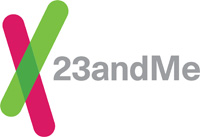 | 2,750+ | 14 mil. | Health testing | See latest price |
 | 2,000+ | 6.6 mil. | Worldwide matches | See latest price |
 | 24 | 1.4 mil. | Distant ancestry (y-DNA, mtDNA) | See latest price |
 | 80 | 300,000 | British roots | See latest price |
This guide will also touch on the various types of DNA tests (autosomal, Y-DNA, mtDNA) and explain the differences in an easy-to-digest format.
Choosing the Best DNA Test for You
For the purposes of this guide, there are really only five DNA testing kits to choose from whether your interest lies in genealogy or you just want to know your ethnic makeup. Unlike many of the reviews you see on Google, I’ve actually tested each of these kits individually. I also have an extensive background in genetic genealogy (more on that below).
Here are the top DNA tests to choose from:
AncestryDNA
AncestryDNA is a DNA testing service offered by Ancestry.com. AncestryDNA is by far the more popular consumer DNA test on the market today. I personally rate it the best overall test for genealogy simply because of the amount of family matches you get.
The main benefit is the enormous customer database which translates to more matches. If your interest in DNA testing is for genealogy and family history purposes, then you simply must test with AncestryDNA. You’d be surprised how many brick walls you can break down with your match list.
Even if you’re just testing for ethnicity results, AncestryDNA is among the more affordable tests on the market today. So you can’t go wrong.
Ancestry.com is also a genealogy website that offers a wide range of historical records (with a paid subscription) for users to search through, including census records, military records, immigration records, and more. These records can be useful for genealogy research, as they provide information about a person’s ancestors and their lives.
- Largest customer database which means more matches
- Strong genealogical community
- Offers free trial to genealogical records
- Free to create family tree
- Can link your DNA results to your online family tree
- No YDNA or mtDNA testing
- No raw DNA upload feature
- Cannot view match’s family trees without paid subscription
Ethnicity Estimates
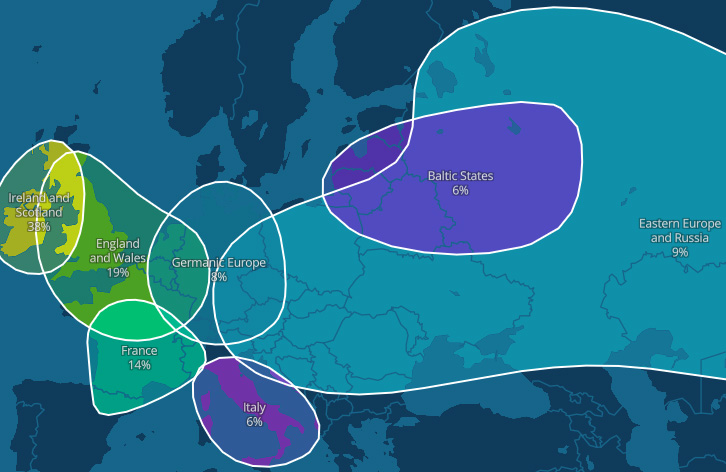
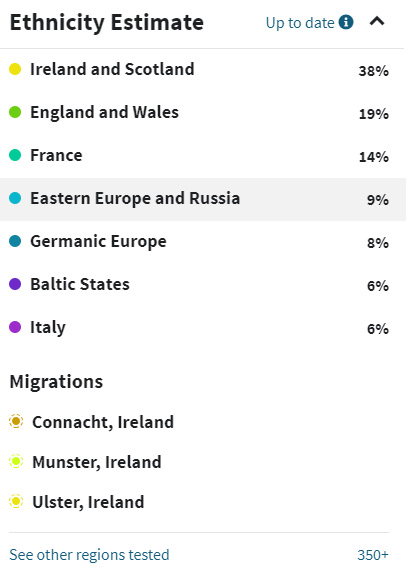
Matches
Here’s what to expect for your matches list. I currently have 231 matches (4th cousins or closer). More are being added every day as more people get tested.
*Note that I blurred out the photos and blocked the names of my top matches for privacy reasons.
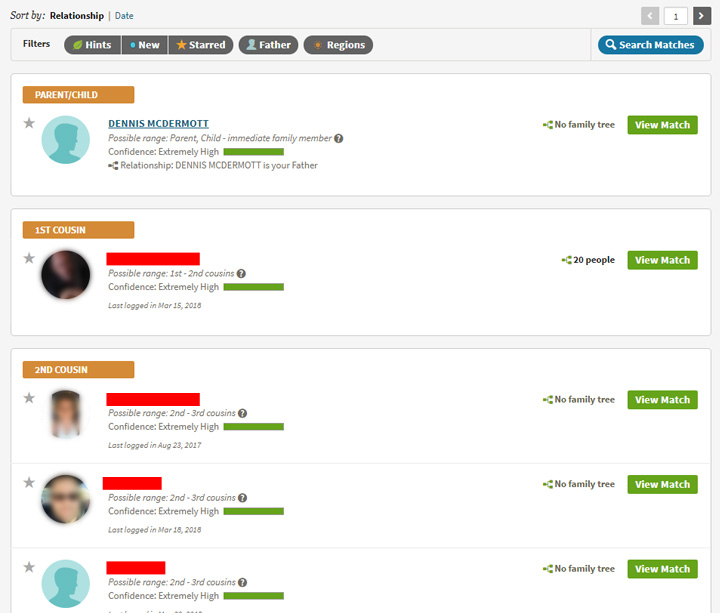
Read my complete AncestryDNA review.
23andMe
23andMe is a DNA testing company that offers genealogical DNA testing, health risk assessments, and carrier status testing for various inherited conditions. 23andMe is the only genetic testing company in this guide to offer health testing.
- Only company to offer health testing
- 70+ reports for genetic health risks, wellness, carrier status and traits
- Bundles basic YDNA and mtDNA testing for free
- Offers chromosome browser for advanced DNA analysis
- Smaller customer database compared to competition
- More people use private profiles which is not ideal for genealogy
- Cannot upload raw DNA
Ethnicity Estimates
Currently, 23andMe compares your DNA to 151 reference populations around the world. I only look at results above the 1% threshold for genealogical purposes. Here are my results:
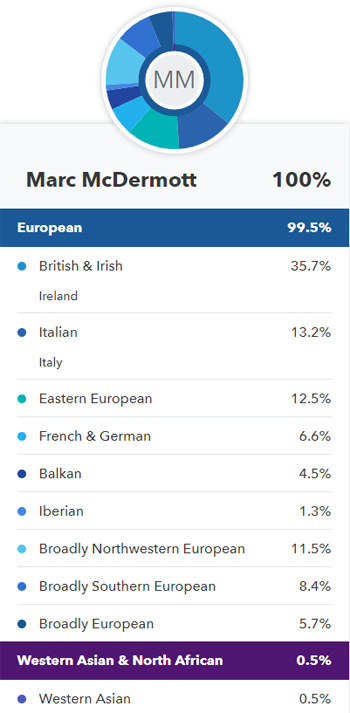
Matches
I currently have 962 matches (includes distant cousins). Roughly 30% of my matches opted not to share their ancestry composition results which makes things hard for genealogists.
The lack of matches who have an interest in genealogy is far less than the competition. See 23andMe vs AncestryDNA.
*Note that I blurred out the photos and blocked the names of my top matches for privacy reasons.
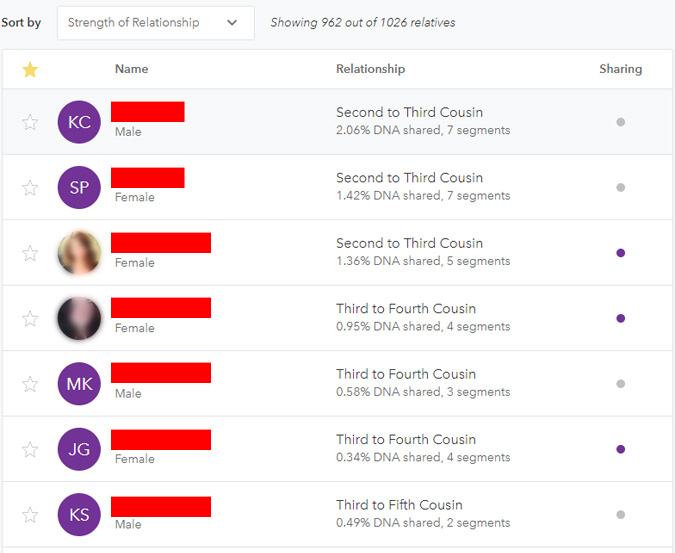
It’s also worth noting that 23andMe does not provide reports for your Y-DNA or mtDNA matches.
Health Reports
If you buy the 23andMe Ancestry + Health test, you’ll also get the following reports:
- Health Predisposition: The genetic predisposition report includes information about an individual’s genetic risk for certain health conditions, such as Late-onset Alzheimer’s disease, Parkinson’s disease, and celiac disease, based on the presence of specific genetic variants. They do not diagnose cancer. These reports can help individuals understand their genetic risk for certain conditions and make informed decisions about their health and lifestyle.
- Carrier Status: The carrier status report includes information about an individual’s genetic risk for passing on certain inherited conditions, such as cystic fibrosis and sickle cell anemia, to their children. This report can help individuals make informed decisions about their family planning.
- Wellness: The wellness report includes information about an individual’s genetic risk for certain physical and behavioral traits, such as sleep duration, lactose intolerance, and bitter taste perception. This report can help individuals understand their genetic risk for certain traits and make informed decisions about their lifestyle, diet, and well-being.
- Traits: The traits report includes information about an individual’s genetic risk for certain physical and behavioral traits, such as eye color, hair texture, and muscle performance. This report can help individuals understand their genetic risk for certain traits and learn more about their ancestry and inherited characteristics.
These reports are not a medical diagnosis. It’s important to review your test results with your doctor.
FamilyTreeDNA
FamilyTreeDNA is a DNA testing company that offers different types of DNA test kits including autosomal, Y-DNA, and mtDNA . FamilyTreeDNA is the only genetic testing company in this guide to offer dedicated Y-DNA and mtDNA testing.
- Offers separate tests for YDNA and mtDNA (only company who has this)
- Y-DNA and mtDNA matching
- Incredibly passionate genealogy community
- Free upload of raw DNA
- Chromosome browser for advanced DNA analysis
- Smaller customer database compared to competition
- Website not as user-friendly compared to competition
Ethnicity Estimates
My FamilyTreeDNA results are much broader than the other tests. Whether that’s a good thing or not I’m not sure. On the one hand, the broader the result the more accurate it tends to be. On the other, it doesn’t really tell me a whole lot.
I recommend reading the descriptions they provide for each geographic region so you know exactly what included in say, ‘West and Central Europe.’
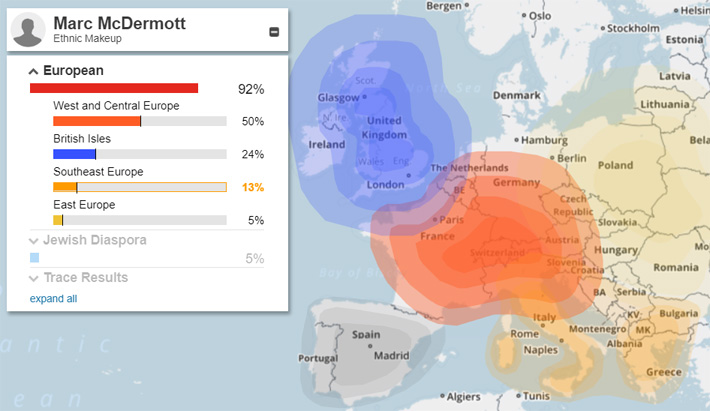
Matches
FamilyTreeDNA shows me 1,307 matches. What I like about this table is that they have dedicated columns for shared centimorgans. Other sites have this information, but it’s not as easy to find.
*Note that I blocked the names of my top matches for privacy reasons.
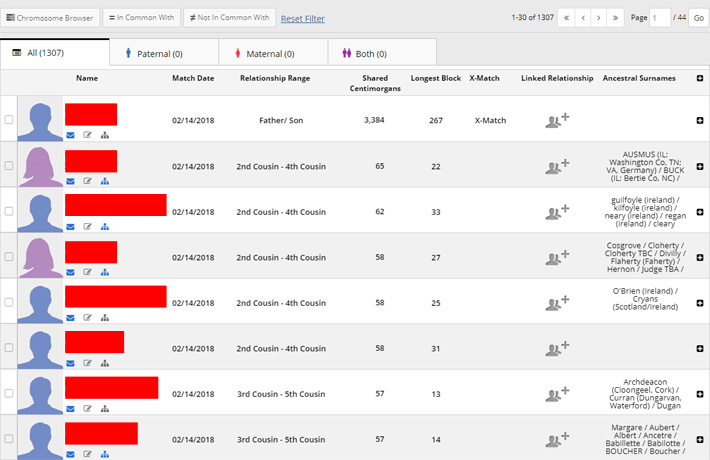
MyHeritage
MyHeritage is a DNA testing company that often has the lowest price on autosomal testing kits. MyHeritage also has the largest database of international matches among the big five companies.
MyHeritage is also an online genealogy platform with an extensive collection of historical records for genealogy research. MyHeritage is most similar to Ancestry.com.
- Largest international customer database which means more global matches – especially in Europe
- $5 raw DNA upload
- Chromosome browser for advanced analysis
- Cheek swab instead of saliva collection method which is easier for some
- No YDNA or mtDNA testing
- Fewer geographic regions compared to competition
Ethnicity Estimates
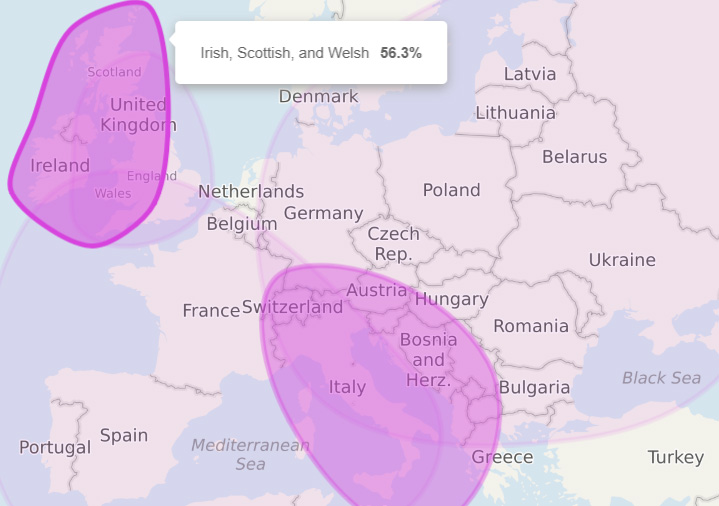
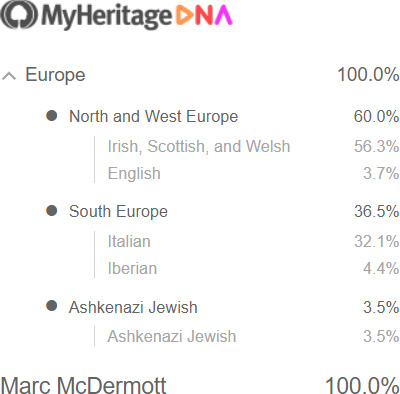
Matches
Here are my top two matches from MyHeritage. Like FTDNA, they also show shared centimorgan data which I really like. Many people tend to use MyHeritage’s free family tree tool which can be very helpful for genealogy.
One thing I like about MyHeritage versus the other genetic testing companies is that they tend to have more matches from Europe.
*Note that I blocked the names of my top matches for privacy reasons.
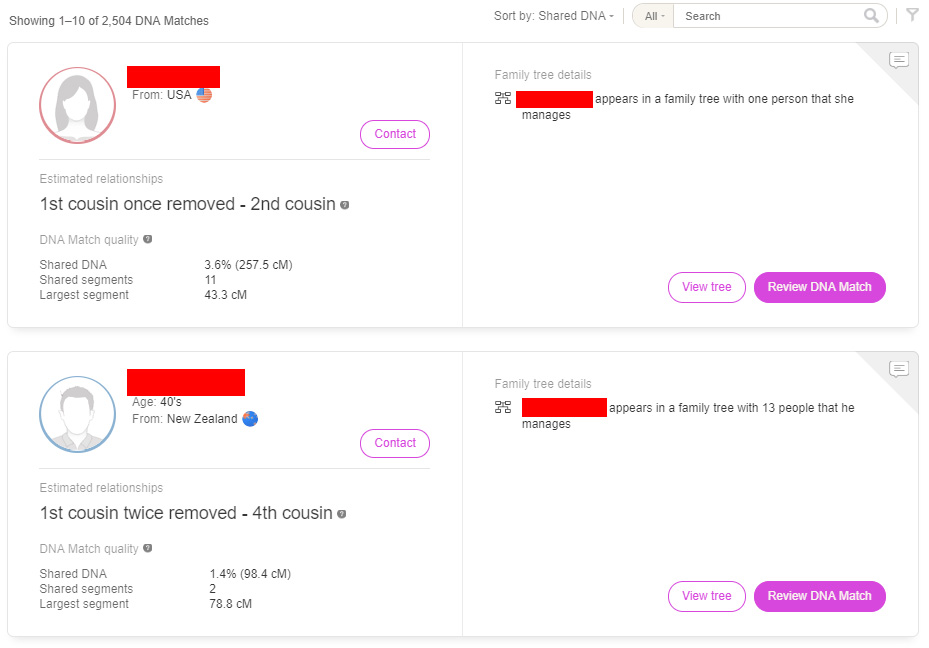
LivingDNA
- The Cadillac of tests if you have any British roots
- High definition geographic regions for British Isles
- Basic YDNA and mtDNA test bundled into standard test
- More expensive than competition
- Currently no customer match database
Ethnicity Estimates
LivingDNA lets you choose your confidence level when viewing your estimates. There are three levels: complete, standard, cautious. This just adjusts the level of statistical confidence they have in the estimates. I tend to stick with ‘Standard.’
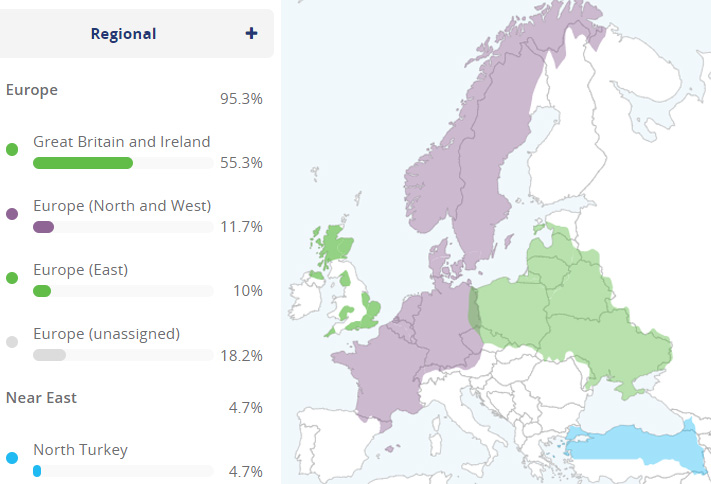
Matches
LivingDNA does not currently offer a matches report for Y-DNA or mtDNA matches. And the matches report for the autosomal testing is extremely limited due to their smaller database size when compared to sites like Ancestry. For context, I still only have one match as of May 2019.
Types of tests
There are actually three main types of home DNA tests on the market today. We need to clarify which type of test we’re looking for.
- Autosomal
- Y-DNA
- Mitochondrial DNA (mtDNA)
This section is not intended to confuse anyone or to get into the nitty-gritty of each test. I’ll reserve that for specific posts for each type of test.
The most important thing to know here is that an autosomal test is what 95% of people want. It’s the test that every company offers and the most useful for genealogy.
Dedicated Y-DNA and mtDNA tests are currently only offered by FamilyTreeDNA and are used for more advanced genealogical purposes (more on that later).
Autosomal DNA
An autosomal test is by far the most common – it’s the type of test that most people would think of when they think of DNA testing.
It’s the test that reports on your ethnicity and the one that gives you the most helpful matches for your genealogical research.
Every company offers the autosomal test – in fact most companies only offer this test.
Put simply, it looks at your autosomes, which are your first 22 pairs of your chromosomes. It does not look at the 23rd chromosome which is the gender chromosome.
Autosomal tests look at single-nucleotide polymorphisms (SNPs). SNPs are variations in a single base pair (A, T, C, or G) in the DNA sequence that can occur at specific locations within the genome.
Because it only looks at your autosomes, the DNA being analyzed is from both your father and your mother – whether you’re male or female (more on this point later).
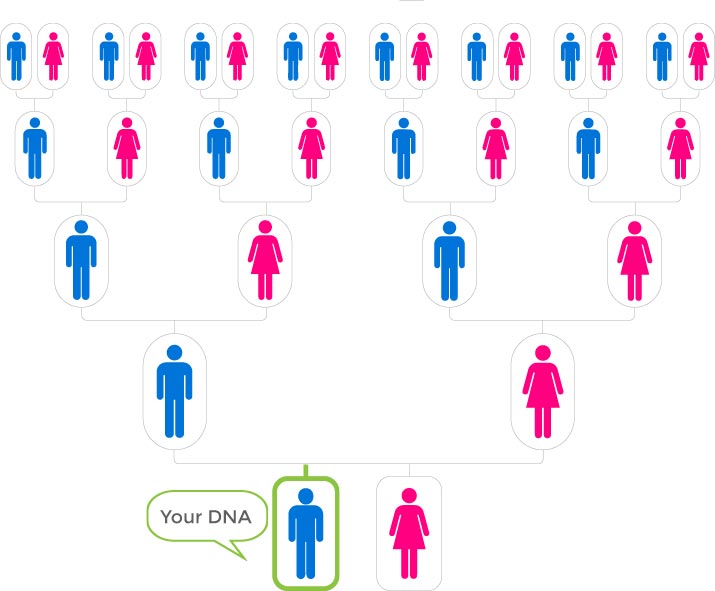
Everyone should take an autosomal test. It’s sort of the default, or baseline test you need to take whether you’re getting into genealogy or just want an ethnicity report.
I recommend using AncestryDNA primarily because they are the most popular and therefore have the largest DNA database of potential matches.
Whoever you test with, you can always transfer your raw DNA data to other companies for additional analysis.
Y-DNA
A Y-DNA test looks only at the Y chromosome. And since only males have a Y chromosome, females, unfortunately, cannot take this test.
To recap grade school science class, the 23rd chromosome pair and is the gender chromosome. Males have both X and Y whereas females have two X’s.
And since females do not have a Y chromosome, they cannot pass this down to their children. Because of this, males can only receive a Y chromosome from their father – not their mother.
So what does that mean for DNA testing?
It means that the results you get from a Y-DNA test only look at your father’s direct paternal line (your father’s father’s father…etc).
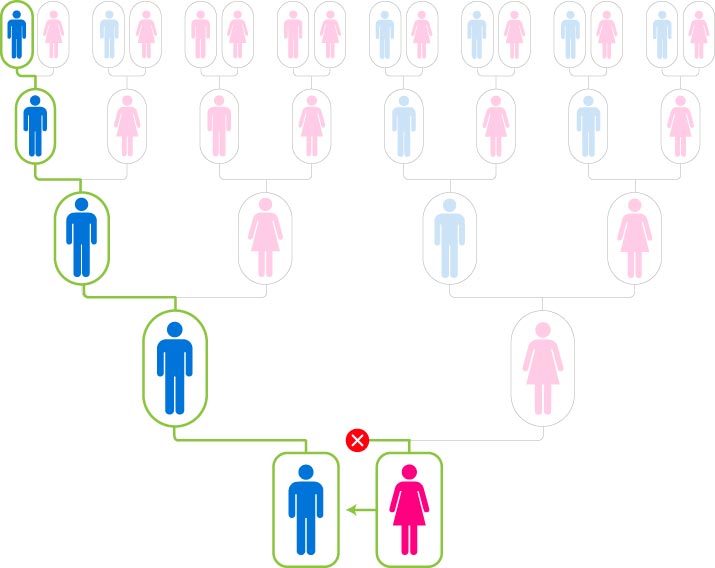
So how is that helpful?
Unlike your autosomes, the Y chromosome changes very slowly over time which means that you can get matched with someone who you share a common ancestor with from say 500 years ago (autsomal tests really only go back 150-200 years maximum).
A good way to think about this is if you want to know if you’re related to someone who shares your same surname.
So if I wanted to know, with certainty, if I’m related to the actor, Dylan McDermott. A Y-DNA test would tell me that (assuming I could get Dylan to take the test of course).
This type of Y-DNA test uses short tandem repeat (STR) markers (different from SNPs). These are dedicated Y-DNA tests and currently only offered by FamilyTreeDNA.
These dedicated Y-DNA tests are more expensive that autosomal tests. Depending on the level of testing, the cost can range between $100-400.
YDNA tests also report on your paternal haplogroups using Y-DNA SNP testing. I have a separate article that explains how to find your haplogroup.
Put simply, a Y-DNA test can tell you the ancient origins of your direct paternal line, show you much older matches, and solve specific questions about if two people with the same last name are actually related.
I mentioned above that only males can take this test, so can a woman trace her paternal DNA?
The answer is, absolutely.
You simply must ask a male relative on your paternal line to take the test for you. This can be anyone on this line (your brother, father, grandfather, uncle, male cousin, etc). An easy way to think of it is any male in your family that has the surname you’re looking to research (assuming they’re not adopted).
FamilyTreeDNA is the only company who offers dedicated Y-DNA tests to consumers. Click here to visit their website.
23andMe and LivingDNA bundle in a super basic Y-DNA test with their standard autosomal test. But they aren’t particularly useful because they don’t look at nearly the same amount of Y-DNA as the dedicated tests from FamilyTreeDNA.
So if you a Y-DNA test is what you’re after, FamilyTreeDNA is the only option.
See my complete guide to Y-DNA tests.
mtDNA
An mtDNA is (somewhat) similar to a Y-DNA test in practice, but not at all in terms of science.
mtDNA tests look at your mitochondrial DNA, which both males and females have. But even though both males and females have mtDNA, only females can pass it down to their children.
That means that the mtDNA you have right now is only from your mother.
None of it comes from your father. That’s why I say this test is similar (in practice) to a Y-DNA test.
While a Y-DNA test looks at your direct paternal line (your father’s father’s father), an mtDNA test looks at your direct maternal line (your mother’s mother’s mother).
YDNA can only be passed from father to son, but mtDNA is passed from the mother to both male and female children. That’s why anyone is able to take this test.
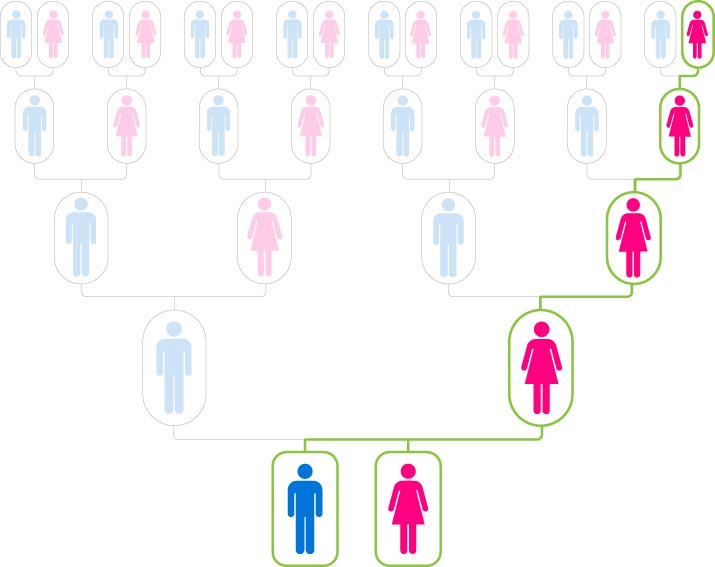
In terms of practical use, mtDNA tests can be very valuable but not nearly as much as Y-DNA or autosomal tests.
They’re moreso used to answer specific questions in your genealogical research.
FamilyTreeDNA is the only company to offer dedicated mtDNA tests. Click here to learn more.
See my complete guide to mitochondrial DNA testing.
Why take a DNA test?
- Discover your ethnicity and learn more about which parts of the world your ancestors came from.
- Find living relatives to connect with through your match list. This is by far the most important for me as it allows you to share research, family stories, and even photographs of your ancestors. How nice would it be to see a photograph of your 2x Great Grandfather for the first time?
- Prove a relationship – or lack of a relationship. Whether this be to a parent, sibling or close cousin.
- Direct your genealogy research. By connecting and working with several of my DNA matches, I was able to determine where in Ireland my 3x Great Grandfather lived. Now I can focus my research on that region of Ireland to learn more about his life before leaving for America.
- Collect evidence to help confirm an ancestor’s identity or to strengthen research conclusions. Sometimes initial findings of a paper trail just isn’t enough to confirm that two people from the 1800s are related or even that two people with the same name are the same person. DNA testing can provide strong evidence and encourage us to dig deeper to find the paper trail.
How DNA tests work
Genealogical DNA testing allows individuals to explore their ancestry and familial relationships. This is typically done through a simple saliva or cheek swab sample, which is then sent to a laboratory for analysis.
The testing company compares the DNA sample to a database of DNA from various reference populations around the world to determine an individual’s ethnicity and ancestry from different regions.
This type of testing can also be used to confirm or challenge traditional family history research, as well as discover previously unknown ancestors and connections.
To begin the process, individuals typically visit the testing company’s website and purchase a DNA test kit. The kit, which includes instructions for correctly collecting a sample, is mailed to the individual and comes with a prepaid shipping label to send the sample back to the laboratory.
After a few weeks of processing, the individual will receive their results via email, which includes information on how to access the reports online.
Who Should Take a DNA Test
Anyone interested in learning about their ancestry, as well as assessing their potential health risks and carrier status for certain genetic conditions, should consider taking a DNA test.
This includes individuals who are adopted or are unsure of their ancestry, as well as those who are simply curious about their heritage.
DNA tests can provide a wealth of information about an individual’s ancestry and can help connect them with distant relatives they may have never known existed.
Who Should Not Take a DNA Test
If you’re someone who is uneasy about sharing your personal genetic information with a company or third party, then perhaps taking a DNA test isn’t the best choice for you. It’s important to weigh the pros and cons of such a test before making a decision, and if you feel that the potential risks to your privacy outweigh the benefits you may gain from the test, it might be best to opt out.
Similarly, those who are worried about the potential negative consequences of genetic testing, such as discrimination or the violation of their privacy, should also carefully consider whether a DNA test is the right choice for them. It’s understandable to have concerns about these issues, and it’s important to take them into consideration before proceeding with a test.
Ultimately, the decision to take a DNA test is a personal one and should be based on your own preferences and concerns. Some people may not feel a strong desire to learn about their ancestry, or may not feel that the information provided by the test will be particularly meaningful or relevant to them. If that’s the case, then it might make sense to hold off on a DNA test for now.
How’d I Choose These Companies?
To choose the best DNA testing companies, I considered various factors such as the accuracy and reliability of the tests, the size and diversity of the databases, the range of information provided in the reports, and the overall value for the price.
I also looked at the level of customer service and support offered by each company, as well as their privacy policies and security measures.
To gather this information, I used data from customer reviews, industry experts, and independent research studies. I also took into account my own personal experiences with these companies, including any testing I have personally conducted or assisted with.
My goal was to create a comprehensive list of the best DNA testing companies that offer the highest quality services and the most accurate and comprehensive results.
Why You Should Trust Me
I have extensive experience and expertise in the field of genealogy and DNA testing. As a member of the National Genealogical Society and a volunteer at the DNA Doe Project, I have a strong understanding of the various DNA testing options available and how they can be used effectively for genealogy research.
I have also worked with adoptees to find their birth parents using DNA and have assisted law enforcement in using DNA to find violent criminals and unidentified individuals.
This hands-on experience has given me a unique perspective on the capabilities and limitations of DNA tests, and I am able to provide informed and reliable reviews based on my firsthand knowledge and expertise.
Unlike most of the reviews you find on the web, I’ve personally tested with each of these companies.
FAQ
What is the best test for adoptees?
The right DNA test for adoptees will depend on a few factors. There are three (very different) reasons why most adoptees want to take a DNA test.
First is to be aware of any genetic health concerns. For that, 23andMe is the only option.
Second is to determine your ethnicity. Any of the five companies in this guide will work.
Third is to find your birth parents. For this third scenario, typically a basic autosomal test will suffice. But sometimes you may want to take a Y-DNA or mtDNA test if you have a specific hypothesis to test.
If you could only buy one autosomal test, I’d go with AncestryDNA because they have the largest database of customers to be matched with. Once you have your AncestryDNA results, you can actually download your raw data, and upload it to both FamilyTreeDNA and MyHeritage (for a very small fee).
If you’re really advanced, you can even upload your DNA to a third party website called GedMatch. The idea here is you want as many matches as possible, so you need to fish in more than one pond.
Finding your birth parents can be extremely easy, or extremely difficult. It takes some basic genealogical research using the family trees of your matches.
What’s the best testing kit for health reports?
The best testing kit for health reports is 23andMe. 23andMe is the only company who offers health testing.
What’s the best test for Native American ancestry?
If you think your Native American ancestor lived within the last 5-6 generations, any of the autosomal tests in this article will help you.
It all depends on how much of that particular ancestor’s DNA was passed down through the generations.
A lot of people think they have Native American ancestors because of family rumors or the stories you were told as a kid. But more often than not, those stories were not true.
There is a lot to talk about on this topic, so I will point you to this guide on Native American DNA tests which explains everything in more detail.
In a nutshell, a DNA test proving your Native American ancestry isn’t enough to enroll in a tribe. But it can be the first step in your research to document your heritage in order to apply.
Conclusion
The most important thing to remember is there really isn’t a ‘best’ DNA test, because everyone has different reasons for taking the test.
Prices tend to change throughout the year with different promotions, so be sure to check the link in this article for the latest price.
If you’re still unclear or want my advice, post in the comments below and I’d be happy to help.
I hope this guide to DNA testing was helpful and you now have a clear picture of the best DNA test for you based on your goals.

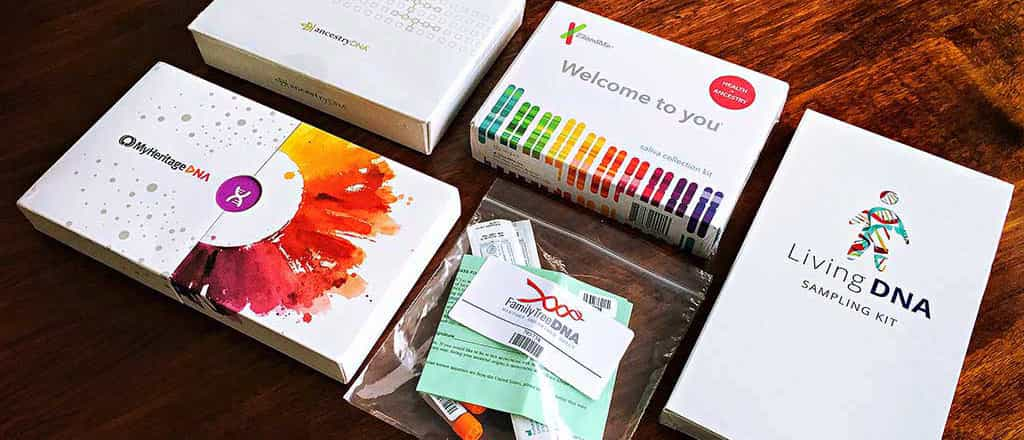


Thanks Marc for all the information and explanations you’ve provided. Have done an Ancestry DNA test as have other members of my family. The results were pretty much as expected and confirmed our relationships. Then Ancestry redid or retested probably because of a larger base of people taking the test, they redid my percentages and not a lot of changes a few dropped in percentage, but the surprise for me was a very small percentage of Native American. There have been no family links to Native American, and we have a pretty large amount of genealogy done going back 8-9 generations in this country (USA). None of the rest of my family got this new result, know that all DNA is not pasted down. Best guess of mine is if true it is a female from early colonial times.
So I guess the best test for me now would be the Family Tree mtDNA test?
Hi Becky. What percentage are we talking about? Under 2%? Anything under 2% I usually don’t worry about because it’s likely just ‘noise’ and not accurate.
Hello, I was born in South Carolina and have taken Ancestry’s autosomal test and also uploaded my results from it to FamilyTree DNA. Also I had two male cousins, one a Bowers on my maternal side, and one a Long on my paternal side take the YDNA test at FTDNA for me. I want to find where each of my maternal and paternal lines came from. I believe my mother’s paternal line, Bowers, came from Germany but where in Germany is what I want to know? I believe my father’s paternal line, Long, came from Germany or possibly Switzerland, but again where in either of those countries? What is the best way to find the answers to these two questions? Thanks for your help!
Hi Barbara. In order to pinpoint exactly where your ancestors came from, you need to combine DNA testing with genealogical research. You may want to consider hiring a genealogist to help you.
Hi Marc
I actually took all five of the DNA tests you talked about in your article and I am still lost with most of the explanations and even question myself why I spent the money. Lol
It was like an addiction.
I started off wondering who
I was so I first took the AncestyDNA test and was somewhat shocked at the results. So after questioning the results I took the 23&me dna test and found that the results were somewhat different then those from AncestyDNA
Oh well I still don’t understand the whole dna thing will all the different tests and have more questions and frustrations
But I do appreciate your articles and will still continue looking
I am trying to ultimately determine who my dad’s biological father is and that’s why I took all five hoping the answer would fall into my lap.
Thank You again
Mark A Ward
Hey Mark. Sorry for the late reply. Have you made any progress with this? Feel free to email me if you need help: marc[at]genealogyexplained.com
Hi, my grandfather was Jewish and I suspect that he changed his name for some reason..which test is the best for me , and where could I find his real name?
You’ll need to combine DNA with genealogical research.
I was wondering why CRI Genetics, was left off the list of tested companies?
This guide focuses on the best companies for genealogical purposes. CRI does not currently fit that description.
Great article! Thanks. It seems like MyHeritage offers DNA health screening. It would be good to hear more about this in your comparison.
Yes, that will be coming soon.
I’m interested in tracing back my patriarchal line, and try to find my “Milton” roots; like what country or village they came from, their Coat of Arms, etc.
I have very limited information on my father’s father.
What’s the best test(s) for me?
Y-DNA is best for ancient ancestry.
I have to say i’m confused on the YDNA testing. I have the basic test from Living DNA which gives me a haplogroup. Interesting but not very useful for research. I understand that Family Tree Y-DNA is more comprehensive but it is very expensive. What more will it give me of practical use? Is it just database access? More and more I feel the quality of the DNA tests is much less significant than the quality of the databases and filters.
Hey Michael. You’re right that the basic haplogroup information isn’t all that useful. It’s moreso a talking point for cocktail parties. The main difference with FamilyTreeDNA is that they match your Y-DNA with others in their database – the same way all these companies do with autosomal tests.
Two things missing. LivingDNA will ship to most places in the world. Most of the others will not. This is useful for expats and those trying to track family remotely. Ancestry does not allow 3rd party DNA to be loaded. Most of the others do.
Thanks, Michael. 23andMe also does not allow 3rd party DNA uploads.
Which test would be best to try to find out about my maternal grandfather’s line? I already know a lot about my maternal grandmother, but almost nothing about him…
Thank you
Depends on what you’re looking to find, but generally speaking, I’d go with Ancestry.
While LivingDNA DOES test for the Y-DNA haplogroup, it does NOT offer matching with others who share your haplogroup and markers and does not offer Surname Projects.
Great point, Elaine. I just updated the guide to make that more clear. Thanks!
If mtDNA is on the X chromosome, and both males and females have X chromosomes and can pass these on to their children both male and female, how is it that we can only inherit mtDNA from our mothers?
Hi Margot. Good question. mtDNA is actually not on the x-chromosome. The x-chromosome is inside the cell nucleus with the rest of your 23 pairs of chromosomes. mtDNA comes from the mitocondria which is outside the cell nucleus. Also males do not get an x-chromosome from their fathers. Males get their x-chromosome from their mother, and their y-chromosome from their father. Females get an x-chromosome from both mother and father. Hope this helps!
Excellent information! I came by this while browsing an email that I received from FamilySearch. I am very interested in being tested for Native American DNA, so now I know where to go. Thank you so much!